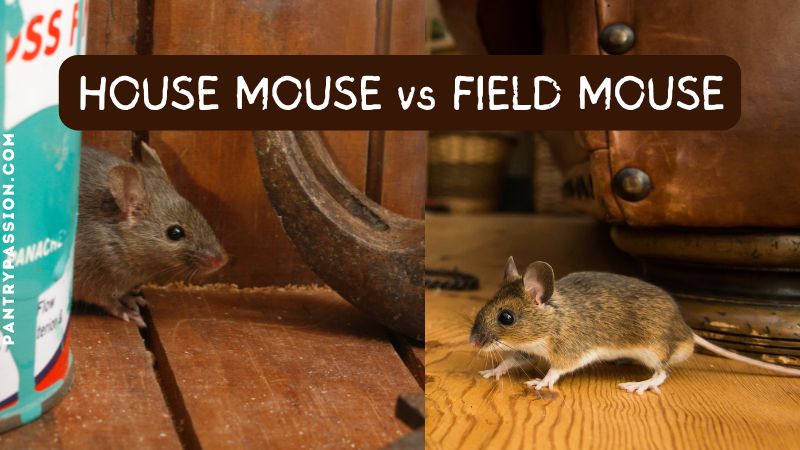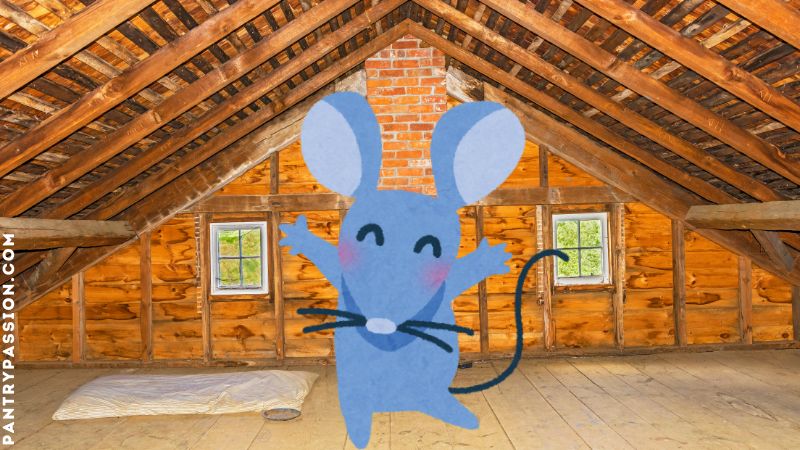The Best Fluffy Pancakes recipe you will fall in love with. Full of tips and tricks to help you make the best pancakes.
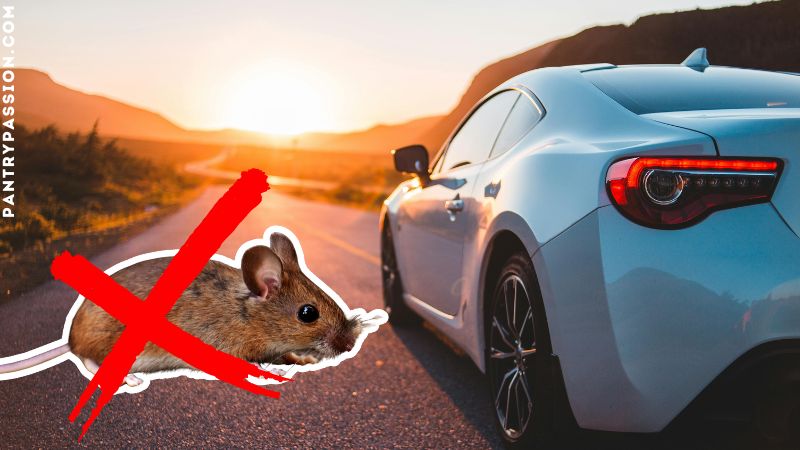
Keeping mice out of your cars, RVs, boats, farm, lawn tractors and mowers, and ATV vehicles is an endless battle. I’ve collected the best advice on what repels mice specifically in vehicles. These tried-and-true stories from real people offer valuable insight of what repels mice naturally.
I don’t have to tell you that mouse pee/urine causes corrosion, rodent chewing damages interiors, as well as causing thousands of dollars in damages to wiring/wiring harness (due to their attraction of soy-based plastics coating of the wiring).
Wherever you park or store your vehicles, whether it’s the great outdoors, a garage, shed, or boat, there is hope to expel mice.
DISCLAIMER: Much of this rodent deterrent advice is anecdotal. In my research I found users that proclaimed overwhelming success, while others failed. I will take personal endorsements any day when it comes to keeping mice out of my cars, RVs, and other vehicles!
DON’T MISS Pantry Passion’s Complete Article List for Mouse & Rat Prevention!
Table of Contents
- Preventative Measures to Keep Mice out of Car, Motorhomes, Boats and More
- To Trap or Not to Trap Inside of Vehicles?
- Physical Deterrents to Keep Mice Out
- Extra Protection for Combines and Tractors
- Light & Movement Keep Mice Out of Cars, RVs & Tractor Cabs
- Using Sound to Keep Mice Out of Cars, Campers
- From the Kitchen: Natural Mice Repellents and Smells That Rats Hate
- Does Peppermint Oil Deter Mice?
- Natural Mouse Deterrent Warnings
- Spicy & Hot Natural Mice Repellents to Keep Mice Out of Vehicles
- Household Products That Keep Mice Away from Cars, Snowmobiles, and All Your Toys
- Animal Scents That Keep Mice Away
- How Long Does Essential Oil Scent Last (and Other Natural Mouse Deterrents)
- In Conclusion
Preventative Measures to Keep Mice out of Car, Motorhomes, Boats and More
First off, the easiest thing you can do to keep mice out of cars:
- Keep food out of your car and farm tractors!
- Wash up beverage spills and vacuum out crumbs that can attract rodents.
- Don’t park car or truck inside a garage where garbage is (this includes pet food or livestock feed).
- Park away from dumpsters that attract mice and rats.
- As soon as you smell mice in a car, spray natural deterrents around the car and under the hood (before they get comfy and have babies!).
- For camping enthusiasts, bring ammonia or peppermint oil and use it everywhere you camp each night, spraying under RV hoods and vans, and under them on the ground (or soak paper towels to put underneath).
- Place deterrents at entry points, such as car tires.
- When parking at your campsite, open the hood for awhile to dispel the heat (mice love warm and cozy spots!).
- Make sure you have the car vent mode in recirculation mode to help prevent rats/mice entering the passenger compartments.
- For vehicles, boats, RVs in storage for winter: open all cabinets, compartment doors, etc. Cover any grill openings that have access to compartments, lift cushions up or remove cushions and store inside home.
- Set out bait, mouse traps, or pail-style traps as a barrier to stop the mice from getting to your car, motorhome, farm equipment, lawn mower, etc. Be generous with the quantity and placement (like the four corners of a shed).
- Sealing entrances: Plug the hole where the mice are going in and out. Park your pickup in a dark shop and have a helper shine a bright light in the engine compartment and under the pickup while you watch where it shines into the cab. A gob of silicone works well to fill the hole. -Claymore
Are you using the wrong type of peppermint oil? Check out Pantry Passion’s Guide to Oil: Winning the Battle Against Mice.
To Trap or Not to Trap Inside of Vehicles?
Chasing mice out of the car is probably easier than trapping a mouse in a car. Use best practices (natural mice repellents) to prevent mice from getting into your car in the first place. As a last resort, some people attach glue traps inside of the car hood/engine area, and mouse traps inside of the car. Desperate times call for desperate measures.
Sticky glue traps would be a last resort – the general consensus is that they are inhumane.

Physical Deterrents to Keep Mice Out
These physical precautionary items that will keep mice out of stored cars, RVs, motorhomes, campers, pop-up campers, boats, motorcycles, lawn tractors, etc.
- Use an inflatable car storage bubble. They’re designed to keep humidity and rodents out.
- Set up an electric fence (may be more effective for racoons who have tried to get into our farm combine!)
- Drive your vehicle on a wire mesh or chain link fence and then electrify the mesh for vehicles in storage.
Extra Protection for Combines and Tractors
Farm equipment that harvests grains attract rodents. Mice will climb all over the equipment, finding any loose grains or corn in cracks or crevices. Operators may also leave remnants from their lunch.
Besides eliminating food sources, remove materials like shop towels that can be used to build a nest in equipment or cars/RVS stored in farm sheds. Don’t forget to keep the farmstead clean and weeds and grass mowed around the buildings – and aggressively poison on the rest of the farm property with bait boxes.
Keep cabs clean and use an air pressure hose to remove the grains from working parts. Then generously place natural mouse deterrents or sprays to discourage mice and other pests like racoons from feasting.
Recently, the raccoons damaged wires in my farm’s combine causing lots of damage – good thing we checked that well ahead of the harvest season. Unfortunately, it cost a few thousand dollars in repairs.

My guys always sprinkled mothballs in the tractor and combine cabs. From what I’ve been reading, vehicle owners are using entire boxes of dryer sheets (update: inside sources tell me it needs to be the Bounce dryer sheets brand). I’m definitely not using as much as I should be!
Should I Leave the Door Open?
Some farmers debate to leave the cab door open or not after the harvest season, giving mice a way out. One farmer who was trying to keep mice out, had racoons move in instead.
Another reason to leave the combine door open is to have your farm cats jump in and get the mice at will. One farmer went as far as to leave the door open and put an old jacket on the cab seat, which the cats loved. He hadn’t seen mice in years.
More than likely, you have experienced the “great mouse escape” when you start up the combine for the season. Have the cats and dogs ready for the event!
It [Fresh Cab] does the trick about 90% of the time… For the other 10% we happily provide a refund.
-Fresh Cab representative
Other factors that can play in are: serious predation (other bigger stronger rodents, or animals, where the smell of Fresh Cab is safer than their sure death); over population, multiple species hierarchy, mice with no sense of smell.
Getting the Mouse Smell Out of Farm Equipment
FYI, the Cab Fresh product needs to be replaced quarterly. Fresh cab and Grandpa Gus’s mouse repellent bags work, but you have to make sure the cab is clean and no mouse smell.
In the video below, this farmer tries out the use of vodka to eliminate the smell of mice in his combine machine (which he said was a success). Once mice detect the scent of other mice, it’s hard to keep them out. Note that he removed the seat and the plastic shell the seat sits on to remove mouse debris first. Locate any nests and remove them, they really hold the mouse smell!
Scrubbing would be a good idea, too. Grab a pet cleaner with enzymes in to wipe out what the mice left. One year, I used a carpet cleaner designated for pets (I don’t have pets in my house). Wow! I discovered that the guys had stepped on a piece of carpet near the kitchen with their farm boots on – that manure smell sure hit the air when I shampooed!
Other ideas to get the mouse smell out are Carpet Fresh (powder, leave it on for a day) and Febreeze spray. Other farmers recommend dropping an air freshener in front of the recirculating air filter (down inside the plastic assembly) so the recirculating air is pulled across the can interior.
One farmer suggested a new, open quart can of coffee in the corner of the cab (sorry, I don’t think I could bring myself to sacrifice a container of coffee!). An open bag of charcoal briquettes can also absorb odors. Some people use it as a deterrent, milage may vary on that one.
Advice From Farmers: Rodents in Farm Equipment
There is no such thing as overdoing it when it comes to preventing mice from chewing on wires in tractors and other equipment. One victim shared that he now spends almost an entire day cleaning out his combine using a leaf blower and various air compressor wands (after emptying the grain from the machine first).
He doesn’t stop there: “We load up the exterior with mothballs and Irish Spring bar soap. The cab gets loaded up with Bounce dryer sheets and the “Cab Fresh” product. In the engine compartment, we will leave a very low sided container with antifreeze to give any rodents who make it up there a fresh drink.”
“After combine is cleaned get a hand sprayer and mix 1/2 & 1/2 diesel fuel and hydraulic oil and spray the combine down inside and out making sure and coat frame rails heavy and spray down the tires after you park it and then put mothballs in the cab and up on the sieves and if on gravel floor spray it down around the tires as well works really well have done for years.” -Tom Nixon
Another farmer claims that the smell of pure turpentine in a container in the cab will deter rodents. -onlyred
“Pour some used oil into the machine and run it a bit….will run to the low spots and taint any trapped seed so the mice are not attracted to it. Bounce sheets in the cab plus a small open container of diesel in the cab plenum. ALWAYS disconnect or remove the batteries.” -Centash
“I also have a working theory that mice hate hydraulic oil. I have a lot of tractors (sound guard Deeres) with oily floorboards that never have mouse problems.” -1972RedNeck
“I liked the spray on products on the outside of the machine and those Cab Fresh packs in the cab, then mothballs in the threshing, separating, and grain tank-engine compartment.” -Albert
“I found out a long time ago that poison isn’t the answer. That draws mice in. I guess mint and lavender also works.” -AGB
“We use some stuff in an aerosol can called Mouse Out, you spray it in a paper bag and leave the bag in the cab. Works very good. Usually refill the bag with spray twice a year or so.” -JoeR
“They got in from an open hole where all the electrical wires come in the side of the cab, and a missing plug in the floor. Completely took the upholstery out an tossed the 3 headliner pieces. When you tear into the cab take the jump seat out and open up the heater box. Clean and then hose the cores down with what ever cleaner you chose. Put in all new filters. I ran for a year with out a headliner to make sure I got the evil little creatures. Take the rear window trim off to get the upholstery off the back wall, and pull the rubber mat off the floor. I put a bunch of steel wool in both the rear corner posts to keep the any of the next wave from getting to the headliner. I put in the cloth newer style headliner after I was certain I had all the critters out.” -D6Joe
Light & Movement Keep Mice Out of Cars, RVs & Tractor Cabs
There are many rodent-catching endorsements of using light and motion to keep mice out of cars, RVs, and other vehicles. Using lights in combination with sound strategies is a good duo.
I would caution playing music around chickens during night time hours that could disrupt sleep patterns and egg laying production. Chickens love to eat mice (and snakes, too!), so they’re part of your “keep mice out of shed” team! If you have a bigger infestation, than you will need to apply a combo of strategies. Rats are probably too big for chickens to handle.
The only downside of using lights is your electric bill. You will have to decide how long you feel you need to implement keeping the mice out of your cars and campers with this technique.
Here is how the experts are doing it:
- Install motion detector lights around parked vehicles/vehicles in storage.
- Use solar lights around perimeters of vehicles.
- Place blinking Christmas lights (in attics, crawl spaces, stored vehicles such as your vintage cars in storage and farm tractors).
- Use strobe lights to keep mice out of tight spaces (as well as squirrels).
- Leave the vehicle hood up in garage, with the garage light on (this goes for riding lawn mowers, too).
- Aim lights at the tires (usually the first entry point for mice).
- Honk the horn to scare mice away.
- String up milk jugs to branches and let the wind rustle them.
- Novel solution: set roomba vacuum cleaner to run at night.
Shawn Woods, the mouse pro from Youtube made a short video on strobe lights. The real information is in the comments from viewers. Although he tried out a very expensive strobe light, you can do it much more economically. Judging by the comments, the strobe lights really do work. He had no luck with a solid string of lights.
Experienced camp advice:
“We have some magnetic motion lights that we put under the hood. I’ve also been at an RV park in Arizona where everyone had rope lights under the edge of their RVs to keep the packrats out.” -trailquail
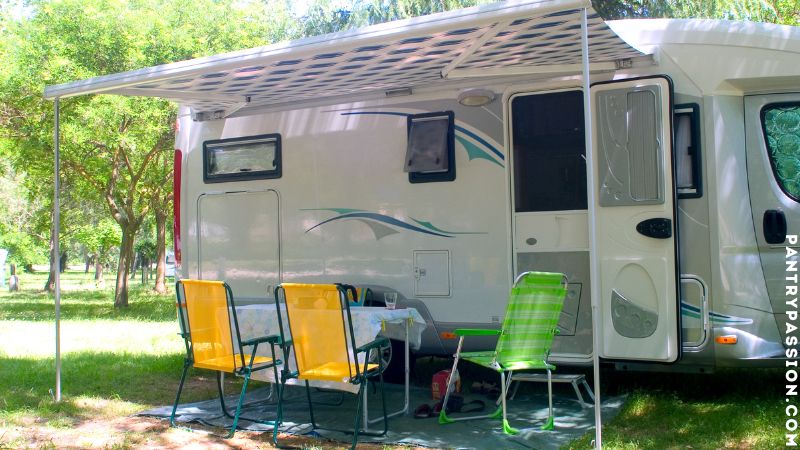
Using Sound to Keep Mice Out of Cars, Campers
The use of radios and other noises can be used for both longer-term and short-term strategy. In the case of short-term, blasting sound can chase animals out of holes, from under buildings, and forcing them out of attic and crawl spaces.
Keep Pests Out of Sheds, Gardens, & Goldfish Ponds
It’s not just for mice, blasting music deters racoon, ground hogs, skunks, squirrels, fox, and coyote. This advice comes from farmers and homesteaders who might also be trying to keep mice/rodents and predators out of chicken coops or away from free-ranging chicken (again, I don’t think the chickens would appreciate the music at night!).
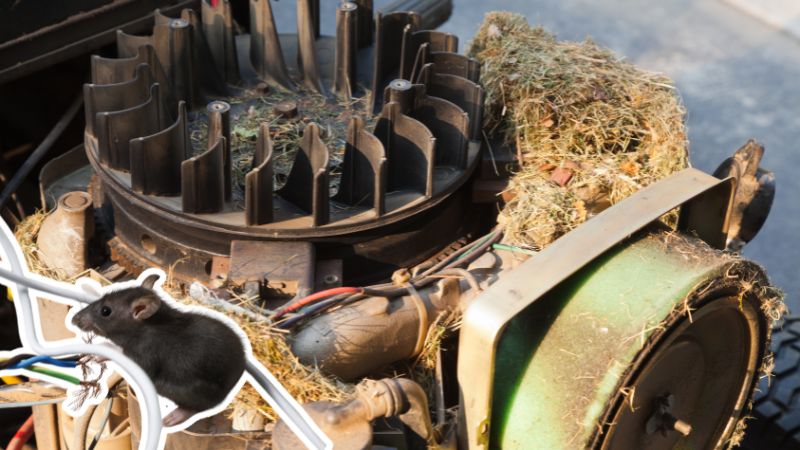
Radio keeps deer out of vegetable garden and racoons out of sweet corn patches. One guy mentioned he had the radio protecting his garden every night, but forgot one night and the racoon wiped them out. One person mentioned keeping a radio on keeps racoon away from her goldfish pond.
Another user proclaimed, “Turned the garage radio on over 20 years ago and have never seen signs of rodents. Had to finally buy a new radio!”
Best Ways to Use Sounds to Deter Mice
If you’re interested in chasing animals away from tractors, lawn mowers, ATVS, and cars and campers stored in out sheds, consider going loud with the noise!
- Talk radio/NPR seems to be the most popular, but it’s good to change the music up.
- Use MP3 player on loop with people talking.
- Drop a bluetooth speaker in hard-to-reach places like heating ducts and attics.
- Keeping a radio on also helps as a deterrent for burglers.
- Leave radio on low at night when you leave your shop or garage.
- Run a vacuum cleaner hose into a hole and leave running for awhile to chase off skunks.
- Place a smoke alarm with weak battery – it will beep for months (suggested by a junkyard owner who puts in cars he wants mice to stay out of).
- Play music, either from car stereo or set up radio near your vehicle.
- Electronic or ultra-sonic mouse deterrent. These devices emit sounds at a high frequency that don’t appeal to mice. I do NOT endorse these. Too many people have been disappointed in their effectiveness.
- Use motion detector that activates high frequency sounds – great for engines!
From the Kitchen: Natural Mice Repellents and Smells That Rats Hate
Your kitchen and pantry hold a plentiful list of natural mouse deterrents. From plants that repel mice, to spicy foods that mice don’t like, we’ve got you covered. For mixing mouse repellent recipes, pick up a Zep Professional Sprayer Bottle for the best spraying experience or invest in a cheap pesticide sprayer for broader applications. Diffusers also work as a bug bomb fogger.
Are you using the wrong type of peppermint oil? Check out Pantry Passion’s Guide to Oil: Winning the Battle Against Mice.
DISCLAIMER: Some experienced folks will tell you that using natural mouse deterrents is a fool’s errand. Consider leaving poison that’s diverts the attraction of mice and rats. Poison blocks, especially outside near possible points of entry work quite well. Be careful of pets and children.
I got this from an old farmer about 20 years ago. Anywhere you don’t want mice, use black pepper along the walls. At first, I tried this in my garage, workshop and crawlspace with traps. After a month of catching nothing with the traps, I just went with the black pepper. Still mouse free for 20 years and counting. Also have done this at various warehouses and machine shops that I have worked at over the years, no mice. Reapply after heavy rain.
-@duncancottam2533 – Youtube comment
TIP: If using natural mouse deterrent like peppermint oil in your RV, motorhome, or camper/pop-up camper, store the oil-soaked material in large ziplock freezer bags until next year to reuse again. Leave camper open a day or two to air out.
Here is a list of smells that mice and rats dislike:
- Onion and garlic. One person suggested placing an onion on glass (mice don’t like glass).
- Mint and peppermint plant. Some people plant around perimeter of house.
- Pure essential peppermint oil, it’s pricey, about $8-10 for 1/2 oz but it’s worth every penny. This is a highly endorsed mouse deterrent. The peppermint burns their airway and is obnoxious to their highly sensitive noses.
- Cinnamon.
- A combo of lavendar + generous helping of ground cloves + citron oil
- Mist a combo of peppermint oil and cayenne pepper spray.
- Bay leaves (they may even cause death to mice is ingested)
- Basil and thyme.
- Spray vinegar
- Lemon grass oil
- Cayenne Pepper, Hot Pepper Flakes, etc. (jump to a dedicated section on that below).
- Mouse mouse repellent pouches. One woman says she never throws these away, only spritzes on peppermint oil and reuses them. Recommended: Grandpa Gus’s Mouse Repellent Pouches.
- Cayenne Pepper or Black Pepper.
Are you using the wrong type of peppermint oil? Check out Pantry Passion’s Guide to Oil: Winning the Battle Against Mice.
FYI: Either legend or lore, there is no smell kills that kills rats instantly. You might be thinking of poison gas. The natural deterrents on the list only encourage rodents to leave the vicinity where they are sprayed or placed. Chemical smells such as mothballs and ammonia encourage mice and rats to avoid these areas, as well.
Does Peppermint Oil Deter Mice?
Peppermint oil, cayenne pepper, pepper and cloves are all natural mouse deterrents. Give them a try! Unfortunately, bears love peppermint oil, so beware! Tea tree oil is not recommended in bear inhabited regions, either.
Are you using the wrong type of peppermint oil? Check out Pantry Passion’s Guide to Oil: Winning the Battle Against Mice.
Homemade Rat Spray for Car Engines or ANY Engines:
RECIPE 1: Mix and pour into small squirt bottle: water, 1 tablespoon of peppermint oil and a couple of drops of dishwasher liquid soap or rubbing alcohol (1 teaspoon of alcohol). Dawn dish/rubbing alcohol help the peppermint oil remain mixed with the water. Spray in engine compartments to combat wire-nibbling rodents (great for non-food areas of your grill, too – smells great to humans, not for mice). To get the oil to mix more easily, create an emulsion with a little bit of peppermint castile soap in warm water with the peppermint oil and shake it up.
RECIPE 2: Use 2 tablespoons of concentrated peppermint or spearmint oil per gallon of water and use as a spray.
Peppermint oil should be applied regularly. Recommendations vary, but it isn’t a long-term fix. Apply once a week or every 2-3 weeks as needed.
Where to Spray Peppermint Oil on Car & RVs
The primary entry point for mice will be running up the wheels of the car and up the shock absorbers (although mice can jump). Mix a spray bottle of peppermint oil up and spray anything that isn’t electrical, or belts, or struts (just outer rims of tires).
Also consider soaking a cloth in the peppermint oil and placing in a thick plastic bag, poke few holes in it and duct tape it at the top under the car hood, right under the windshield; refresh every few months.
Another line of defense is infusing cardboard or cloth with peppermint oil and placing it under your car or RV vehicle to stop mice. The guy below gives a thorough demonstration on spraying his car, in case you’re nervous of where to spray.
Natural Mouse Deterrent Warnings
I was surprised to find this package of Cab Fresh of natural rodent repellent in my pest control stash. One of my family must have picked it up free at a farm meeting. It has a strong smell of cloves, on the package it reads “balsam fir oil.”
Natural pest deterrents should never be stored near poison (or chemicals, gas, and other strong-smelling things). The poison will absorb the smell of these products. The poison then turns into a deterrent and mice will avoid the poison.
I relate the same thing happening to flour, which also has a tendency to absorb smells, such as scented laundry detergent. Anything you bake with the flour will taste like the detergent.
See below where I address mouse deterrent strategy in farm equipment, and why it is so important. This company labels the product “Fresh Cab” because it is targeted to farm tractor cabs – mice are a real problem in any vehicle transporting grains.
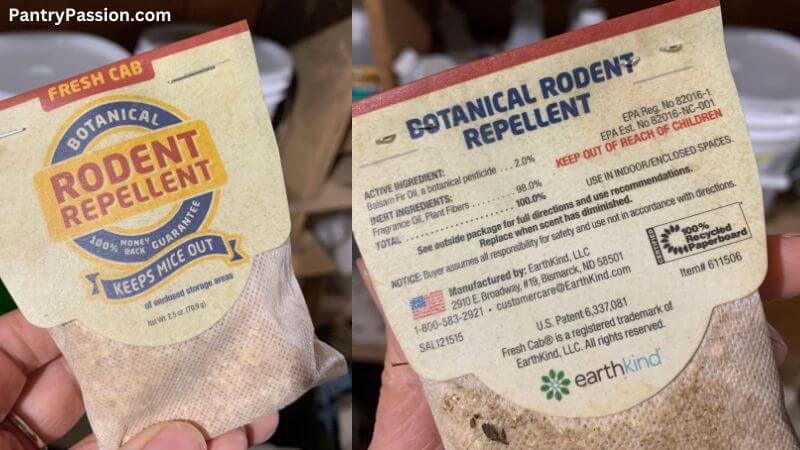
Spicy & Hot Natural Mice Repellents to Keep Mice Out of Vehicles
If you’re not having luck with using hot mice deterrents like pepper flakes and hot sauce, it might not be hot enough! If you want to bump up your mouse deterrent game, you need to learn about Scoville units.
Sidenote: I came across a post where a woman sprinkled cayenne pepper ON TOP of her chicken feeder and then placed mint essential oil on the bottom of her chickens feeders ( they hung in the coop). She thought it was effective, but commented that chickens don’t have the taste buds for “hot” – go figure!
A Scoville unit is a measure of the pungency (spiciness or “heat”) of chili peppers, based on the concentration of capsaicin, the compound that causes the burning sensation. It’s a unit used in the Scoville scale, which ranks peppers from mildest to hottest. The higher the Scoville rating, the hotter the pepper.
Here are some recipes/combos to follow, but TAKE PRECAUTION. Always handle hot products with rubber gloves and avoid touching your face (or private parts – that’s another story regarding and emergency room visit!). Peppers can even cause strokes, especially for virgin mouths.

According to Magic Plant Farms, a flake versus a powder has more surface area, giving more surface area to the mouth: “When you bite into a flake, the pressure physically ruptures the remaining pepper cells, instantly releasing pockets of capsaicin onto your tongue. This is why flakes can feel hotter than powder, even if you are using the same weight or volume.”
Shawn Woods says that the RIGHT pepper with the RIGHT recipe works. In his video below, he mixed pure capsaicin crystals with vodka (because crystals only dissolve in alcohol and are activated with it), and then soaked sunflower seeds in the vodka overnight. One gram of the crystals cost $13 and Shawn dumped it all into about a cup of vodka. Shawn has a reputation of generously dumping ingredients, so you might be able to get by using less crystals.
FYI, the pure capsaicin crystals contained 16 million SHU (Scoville units) compared to the Carolina Reaper having about 2 million SHC. Despite Shawn’s success of using this recipe, I feel the risk to the handler is too great and would not attempt this deterrent.
For the spiciest picks, you will want to consider Caroline Reaper Pepper, a super-hot chili developed in South Carolina. The California Reaper Pepper is not far behind, still in the development stages, but look for California Reaper Pepper Flakes to hit the market soon. And then of course there is Ghost Peppers. UPDATE: Shawn Woods, mouse pro, made a video using Carolina Reaper to repel mice, and it was a fail.
The Carolina Reaper averages a scorching 1,640,000 units, with some tests showing peaks over 2.2 million. To put it into perspective, it’s 10 times more powerful than a habanero. Cayenne peppers typically range from 30,000 to 50,000 Scoville heat units (SHU) according to Chili Pepper Madness.
How Does Cayenne Pepper Deter Mice? According to Bug House Pest Control, “The theory is that the strong, pungent smell and spicy nature of cayenne pepper irritate a mouse’s sensitive nose and taste buds, encouraging them to avoid the treated areas.” Having the rodents step on it and then accidentally rub their eyes/face is secondary.

- Mix 2 T Carolina Reaper pepper powder mixed with cheap table salt in a shaker and spread around perimeter, base of buildings, etc.
- Red pepper flakes
- 1-2 T of hot sauce to 4 gal backpack sprayer, if large building – you want hot sauce over a million Scoville units.
- Sprinkle Cayenne pepper around house – mice can get into new houses, too!
Hot Pepper Recipe to Deter Mice in Cars & RVs. Mix equal parts of red hot sauce and vinegar. Use 2 cups of this mixture to a gallon of water. The hotter the sauce the better. The cheap, generic stuff works – as long as it’s hot, it works fine. Optional: add an ounce of light cooking oil and a teaspoon of dish detergent for adhering. If the sauce is too thick with particles, strain using a cheese cloth. You can make stronger or weaker, but it should have a spicy hot pepper smell to it.
Put the final mix into a sprayer and spray the entire underside of the vehicle and inside the wheel wells. You can use in the engine compartment too. Don’t use in any of the vents. It will wash off after a hard rain and driving.
Household Products That Keep Mice Away from Cars, Snowmobiles, and All Your Toys
Here are popular suggestions to keep mice out. With all chemicals, DO NOT MIX THEM TOGETHER! We want to deter the mice, not kill you!

- Dryer sheets! (update: inside sources tell me it needs to be the Bounce dryer sheets brand). Stuff generously and everywhere. Mice have very sensitive noses and don’t like perfumed dryer sheets. Super-charge your dryer sheet resistance by sprinkling cinnamon powder and peppermint oil on it and roll up tightly with a small piece of tape and put anywhere there is an opening.
- Chlorine puck from the pool. The Youtube user left a comment that he tossed one in an enclosed washing machine, and an hour later the mouse was dead. He now puts chlorine pucks in sandwich bags with holes and puts in vehicles. He reports previously he had lots of problems with vehicles, and now, the chlorine pucks have been in place for 2 years. –@chrisw6785 This sounds like a great long term solution, as the peppermint oil needs to be frequently replenished.
- WD-40 sprayed onto engine parts and wires.
- Tea Tree Oil (stronger than peppermint oil). Spray solution: Mix 10–15 drops of tea tree oil with 1 cup of water and a teaspoon of dish soap. Spray around car (lasts a few days, similar to peppermint oil).
- Spray solution: Mix 10–15 drops of tea tree oil with 1 cup of water and a teaspoon of dish soap. Spray around parked vehicles – great for your home along baseboards, under sinks, and near food storage.
- Another novel mouse deterrent hack is using Comet or Ajax cleaner. I’ve heard of folks sprinkling a circle around the outside of their camper when they put it away for the season. Of course, be aware of accidental pet access.
- Mothballs around engine (you can put in car or tractor cab or semi cab, but then that compartment will smell like mothballs.
- Put a moth cake into a tube sock, and tie the sock around the filler neck of the washer fluid.
- Menthol mouse detterent or jars of Vicks Vapo Rub (this came from a motorcycle owner). Drill holes in the lid and place 1 jar on engine between cylinders, one on front of engine next to filter, and one on seat under the covers.
- Sharply scented gel air freshener pads – Black Ice air fresheners is often recommended by farmers.
- Irish Spring Green in panty hose or jewelry mesh bags.
- Spray ammonia generously, or poke holes in plastic water bottles. Place ammonia-soaked rags inside of plastic water bottles or fill a tin can half full of ammonia. Keeps rabbits and squirrels out of your garden as well.
- Spray full-strength Pine-Sol around lawn mower engine.
- Spread cedar shavings/mulch around RV, pop-up campers, trailers, etc. in storage.
- One woman reported that sprinkling peppermint oil on Bounce dryer sheets held the scent better; another woman said wool absorbs and holds the scent better.
TIP: Spray pepperminit/mint sprasy on a sheet of cardboard and slide under the parking spot of RVs, campers, motorhomes, travel trailers, cars in storage, lawn tractors.
Are you using the wrong type of peppermint oil? Check out Pantry Passion’s Guide to Oil: Winning the Battle Against Mice.
Animal Scents That Keep Mice Away
If you have used cat litter (not the poop, only the pee) you can sprinkle it around vehicles if you’re really desperate! Can use pine litter too – also effective for keeping pests out of the garden.
Spray area with predator urine – fox or coyote works best with mice.
Human urine counts too, according to this avid truck camper: “I will pee on my truck tires occasionally. I know sounds insane and and gross but they don’t like the high concentration pheromones mammals have.” -DependentSquirell296
Do Mothballs Keep Mice Away?
Mothballs were my mother-in-law’s go-to for keeping the mice out of the grain combine machine. However, according to The Family Handyman, mothballs are ineffective — and not safe at keeping mice away.
Despite the strong smell, mothballs are not a reliable mouse repellent. They contain chemicals like naphthalene or paradichlorobenzene, which are designed to kill moths in airtight containers — not repel rodents in open spaces. While mice may dislike the odor, the concentration needed to deter them is dangerously high and not safe for humans or pets.
There are plenty of farmers that swear by tossing mothballs into farm equipment cabs. Unfortunately, the mothball smell is difficult to remove from the cab.
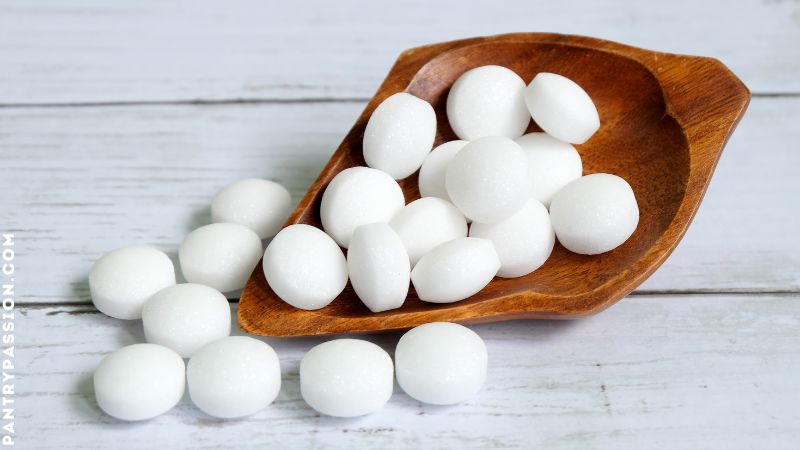
Health & Legal Risks
Toxic fumes can cause headaches, nausea, and respiratory issues.
Illegal use: Using mothballs outside of sealed containers or for pest control violates EPA guidelines.
Environmental hazard: They can contaminate soil and water if used outdoors.
How Long Does Essential Oil Scent Last (and Other Natural Mouse Deterrents)
Here’s a detailed comparison table of common household items used as mouse deterrents, including how long their scent typically lasts before needing to be refreshed.
The scents can lose their potency over time and need to be replaced. If outside, rain can wash away applications. Spray shed and garage with peppermint oil every few months to restore potency.
Homesteaders and farmers have tried these to keep mice out of their sheds, garages, and shops where RVs, classic cars, and tractors:
| Item | Effectiveness as Deterrent | Scent Duration Before Refresh | Notes |
|---|---|---|---|
| Dryer Sheets (it needs to be the Bounce dryer sheets brand). | Moderate (anecdotally effective) | Every 1–2 weeks | Strong scents like lavender or peppermint work best; place strategically. |
| Peppermint Oil | High (widely supported) | Every 2–7 days | Use on cotton balls or in spray; scent fades quickly, reapply often. |
| Bay Leaves | Low to Moderate (limited evidence) | Every few days | May deter some rodents; replace frequently for scent potency. |
| Vinegar | Moderate (natural repellent) | Every 3–7 days | Use undiluted or in spray; disrupts scent trails, but fades quickly. |
| Onion | Moderate (strong sulfur scent) | Every 2–3 days | Use fresh slices or peels; scent dissipates fast and can rot. |
| Pine-Sol | Moderate (strong pine scent) | Every 3–7 days | Use diluted spray or soaked cotton balls; scent fades over time. |
Tips for Using Natural Mouse Deterrents
- Combination deterrents: Layering scents like peppermint oil with vinegar or Pine-Sol can increase effectiveness.
- Target entry points: Focus on baseboards, under sinks, behind appliances, and known rodent paths.
- Refresh regularly: Most natural scents fade quickly, so consistency is key.
- Extend potency length: One user recommends applying peppermint oil drops to dryer sheets, another person says the peppermint scent has lasted longer if applied to wool.
Natural Deterrents That Are Harmful to Pets
- Mothballs
- Ammonia
- Peppermint Oil
- Clove, Cinnamon, and Cayenne Pepper
- Eucalyptus Oil
Are you using the wrong type of peppermint oil? Check out Pantry Passion’s Guide to Oil: Winning the Battle Against Mice.
In Conclusion
Fighting mice in vehicles is an ongoing battle. They’re smart, but you have to be smarter. Sometimes the trick is swapping out methods, because what worked one season doesn’t work the next, or the mice become immune to it.
Stay strong and keep fighting those nasties!




